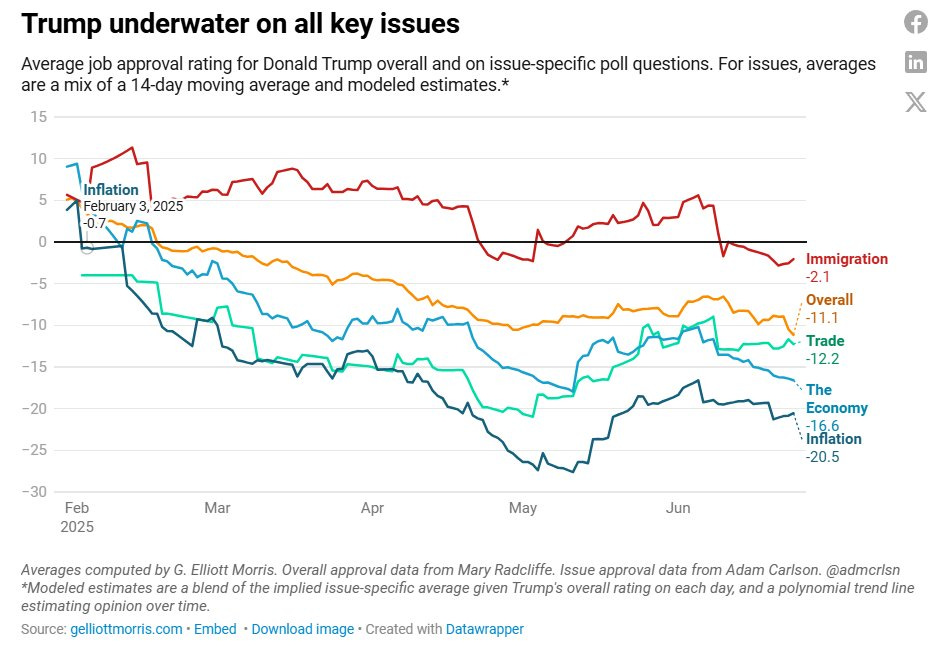U.S., Israel, and Iran: Political Fatigue and Strategic Awakening
The recent escalation between Israel and Iran has exposed an uncomfortable reality for all parties involved—but above all, for Israel and its historic dependence on U.S. backing.
Trump, Trapped Between His Base and Israel's Expectations
Donald Trump faces one of the most complicated dilemmas of his campaign and administration. The first six months of his return to power have been marked by low approval ratings, even within traditionally favorable sectors. His joint attack on Iran alongside Israel has further eroded his political margin, creating a clear fracture within his coalition: on one side, the neoconservative and pro-Israel sectors; on the other, the "MAGA" base tired of endless wars and unwilling to repeat military adventures in the Middle East. Overall, just 16% of Americans back a new Middle‑East military intervention, while most prefer diplomacy. Trump simply lacks the political capital to engage in a full-scale conflict in a time in which his political capital is being diminished by his failures on the economy, immigration, and inflation.
The attack on Iran, carried out in conjunction with Israel, appears to have been less effective than first advertised. Despite airstrikes that damaged Natanz, Fordow, and Isfahan, experts agree these only delayed the program by some months, not years. As Richard Nephew, a former U.S. official, says:
"I think you would be foolish if you said that [Iran’s nuclear] program was delayed by anything more than a few months."
Moreover, IAEA chief Rafael Grossi warns that much of Iran’s enriched uranium may have been relocated before the strikes. An assertion which seems to be true since there have been 0 traces of radiation.
The missiles launched by Tehran as "retaliation" were essentially symbolic. The United States was informed of the attack hours prior, and it caused no structural damage but instead fulfilled their political purpose: serving as an internal propaganda tool. The missiles Iran launched before/during the beginning of the “ceasefire” were a retaliation against Israel, which launched strikes on Tehran after Trump made his ceasefire announcement on Truth Social. Israel’s actions essentially nullify any criticisms the Trump administration would’ve had on Iran.
Trump was severely unhappy with these events, eventually saying in an interview “We basically have two countries that have been fighting for so long and so hard that they don’t know what the fuck they are doing.” And even though Israel keeps on applying pressure, political realities weigh heavier: Many in America’s populist right no longer see the Middle East as a priority battlefield. They prefer to focus on the southern border, crime, and most importantly the culture war. A new regional war could be the final blow to Trump’s already shaky approval ratings.
Israel: Tactical Victories, Strategic Defeat
From a military standpoint, Israel has achieved significant advances: precision strikes, elimination of key leaders, and increased internal pressure on the Islamic Republic. However, on the broader geopolitical chessboard, Israel is the biggest loser.
Unconditional U.S. support—long a pillar of Israel’s national security doctrine—is rapidly eroding. On the American left, the Gaza conflict has generated organized, open rejection to the point where several Democrat factions now view the Israeli government as an "electoral liability."
On the right, the narrative has shifted. The MAGA movement, once solidly aligned with Israel, now questions the costs of that alliance—not out of anti-Israel ideology, but due to political pragmatism. The wars in Iraq and Afghanistan drained an entire generation, and there is little appetite to repeat history. Rep. Marjorie Taylor Greene, one of Trumps biggest supporters said:
“It feels like a complete bait and switch to please the neocons, warmongers, military industrial complex contracts, and neocon tv personalities that MAGA hates and who were NEVER TRUMPERS!”
American public support for Israel has dropped dramatically: 53% now hold an unfavorable opinion, up from 42% in March 2022. Gallup finds only 46% of Americans feel sympathetic toward Israel—the lowest in 25 years.
Iran’s Nuclear Clock Keeps Ticking
Iran, though battered and mired in internal crisis, still holds a decisive card: its nuclear program. IAEA reports confirm that Tehran possesses at least 120 kg of uranium enriched to 60%, technically one step away from weapons-grade capability. Though their infrastructure is weakened and their economy wobbly, the "nuclear factor" gives them breathing room.
Israel believes wholeheartedly that it cannot allow a nuclearized Iran. But it also knows that without U.S. operational and logistical support, regime change in Tehran is unrealistic.
Conclusion: War of Attrition and the Future of the Alliance
All indications suggest that Trump’s strategy going forward will be symbolic containment: strong rhetoric and diplomatic pressure—but without committing troops or risking an open war. A Washington Post editorial warns:
“Trump risks repeating the Middle East mistakes of George W. Bush… only 16% of Americans support intervention”
Israel, for its part, must face a painful reality: the alliance with the United States still exists, but its nature has changed. Automatic support is quickly fading, increasingly conditioned by internal dynamics in both countries.
Tel Aviv’s greatest challenge is not to destabilize Iran, but to restructure its relationship with Washington in a multipolar world, where neither the progressive left nor the populist right is willing to finance endless wars in the name of "Israeli national security."
Meanwhile, Iran, fully aware of its weakness, will continue betting on a war of attrition—knowing that every missile, no matter how ineffective, chips away at Western patience and divides its adversaries.






Insightful read!